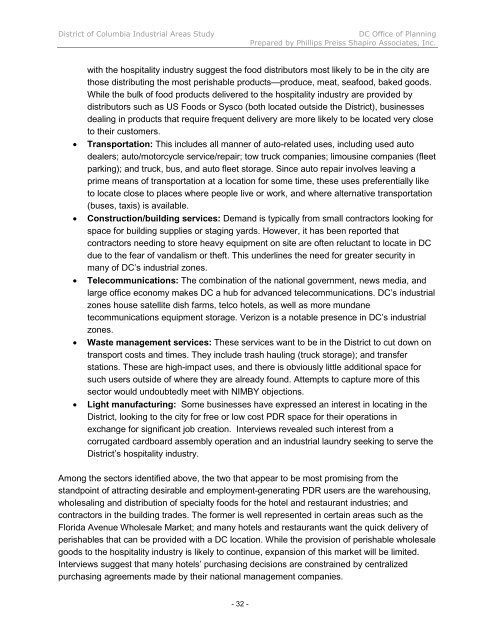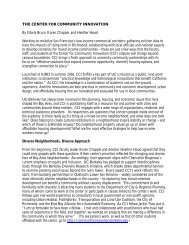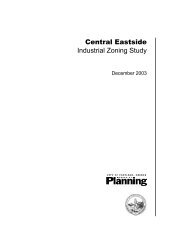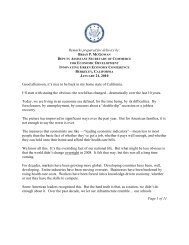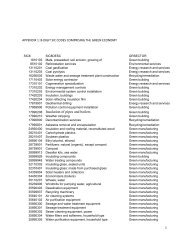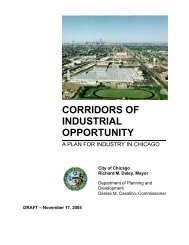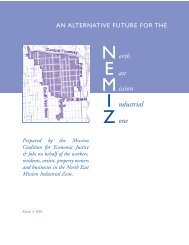INDUSTRIAL LAND IN A POST-INDUSTRIAL CITY District of ...
INDUSTRIAL LAND IN A POST-INDUSTRIAL CITY District of ...
INDUSTRIAL LAND IN A POST-INDUSTRIAL CITY District of ...
You also want an ePaper? Increase the reach of your titles
YUMPU automatically turns print PDFs into web optimized ePapers that Google loves.
<strong>District</strong> <strong>of</strong> Columbia Industrial Areas Study DC Office <strong>of</strong> Planning<br />
Prepared by Phillips Preiss Shapiro Associates, Inc.<br />
with the hospitality industry suggest the food distributors most likely to be in the city are<br />
those distributing the most perishable products—produce, meat, seafood, baked goods.<br />
While the bulk <strong>of</strong> food products delivered to the hospitality industry are provided by<br />
distributors such as US Foods or Sysco (both located outside the <strong>District</strong>), businesses<br />
dealing in products that require frequent delivery are more likely to be located very close<br />
to their customers.<br />
Transportation: This includes all manner <strong>of</strong> auto-related uses, including used auto<br />
dealers; auto/motorcycle service/repair; tow truck companies; limousine companies (fleet<br />
parking); and truck, bus, and auto fleet storage. Since auto repair involves leaving a<br />
prime means <strong>of</strong> transportation at a location for some time, these uses preferentially like<br />
to locate close to places where people live or work, and where alternative transportation<br />
(buses, taxis) is available.<br />
Construction/building services: Demand is typically from small contractors looking for<br />
space for building supplies or staging yards. However, it has been reported that<br />
contractors needing to store heavy equipment on site are <strong>of</strong>ten reluctant to locate in DC<br />
due to the fear <strong>of</strong> vandalism or theft. This underlines the need for greater security in<br />
many <strong>of</strong> DC’s industrial zones.<br />
Telecommunications: The combination <strong>of</strong> the national government, news media, and<br />
large <strong>of</strong>fice economy makes DC a hub for advanced telecommunications. DC’s industrial<br />
zones house satellite dish farms, telco hotels, as well as more mundane<br />
tecommunications equipment storage. Verizon is a notable presence in DC’s industrial<br />
zones.<br />
Waste management services: These services want to be in the <strong>District</strong> to cut down on<br />
transport costs and times. They include trash hauling (truck storage); and transfer<br />
stations. These are high-impact uses, and there is obviously little additional space for<br />
such users outside <strong>of</strong> where they are already found. Attempts to capture more <strong>of</strong> this<br />
sector would undoubtedly meet with NIMBY objections.<br />
Light manufacturing: Some businesses have expressed an interest in locating in the<br />
<strong>District</strong>, looking to the city for free or low cost PDR space for their operations in<br />
exchange for significant job creation. Interviews revealed such interest from a<br />
corrugated cardboard assembly operation and an industrial laundry seeking to serve the<br />
<strong>District</strong>’s hospitality industry.<br />
Among the sectors identified above, the two that appear to be most promising from the<br />
standpoint <strong>of</strong> attracting desirable and employment-generating PDR users are the warehousing,<br />
wholesaling and distribution <strong>of</strong> specialty foods for the hotel and restaurant industries; and<br />
contractors in the building trades. The former is well represented in certain areas such as the<br />
Florida Avenue Wholesale Market; and many hotels and restaurants want the quick delivery <strong>of</strong><br />
perishables that can be provided with a DC location. While the provision <strong>of</strong> perishable wholesale<br />
goods to the hospitality industry is likely to continue, expansion <strong>of</strong> this market will be limited.<br />
Interviews suggest that many hotels’ purchasing decisions are constrained by centralized<br />
purchasing agreements made by their national management companies.<br />
- 32 -


